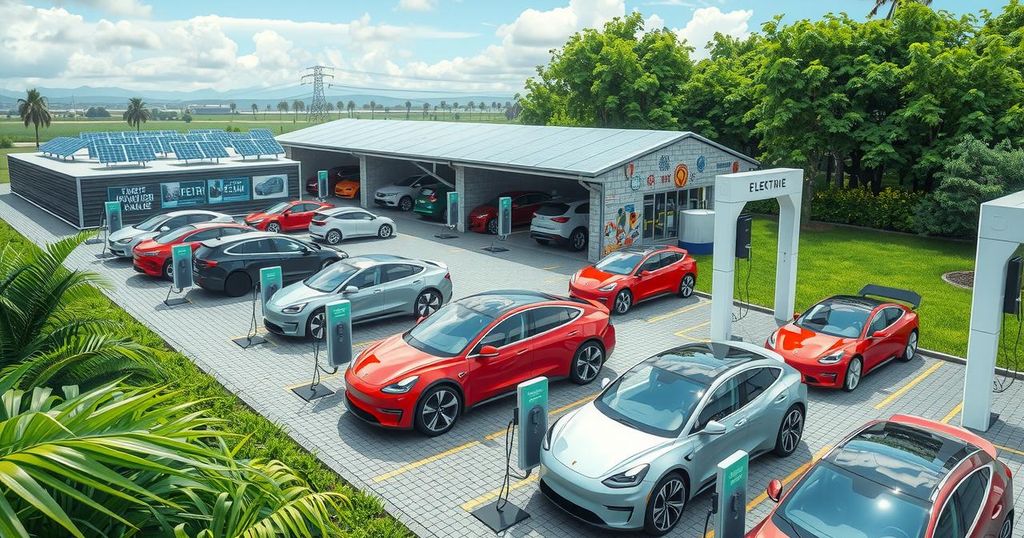BYD Surges Electric Vehicle Shipments to Brazil Ahead of Tariff Hikes

BYD is significantly increasing electric vehicle exports to Brazil ahead of looming tariff hikes. With sales of EVs booming, the company faces legal challenges and a changing tariff regime that could affect its production plans in Brazil. Concerns arise among local automakers about the implications of high import levels on investment in local manufacturing.
In anticipation of a significant tariff increase, BYD, the Chinese electric vehicle manufacturer, has surged its exports to Brazil. Reports from Reuters indicate the company is shipping record numbers of electric vehicles (EVs) to the country, as the future of its production plans in Brazil seem increasingly uncertain.
Brazil, which ranks as the world’s sixth-largest automotive market, is witnessing rapid growth in both fully electric and hybrid vehicle sales. According to the Brazilian Association of Electric Vehicles (ABVE), sales for 2024 are projected to rise by 85 percent, surpassing 170,000 units. In fact, BYD alone saw its sales soar nearly 328 percent last year, striking a total of 76,713 units sold.
However, the attractive tariff structure that encouraged BYD’s entry into the market back in 2015 is undergoing a transformation. Imported EVs, initially exempt from tariffs to stimulate market growth, now face escalating tariffs, starting at 10 percent in January 2024 and potentially reaching up to 35 percent by July 2026. Presently at 18 percent, the tariff is set to increase to 25 percent in July, amid pressure from Brazilian automakers’ association Anfavea, which is pushing for an earlier implementation of the peak tariff.
Chinese manufacturers are forecasting nearly a 40 percent increase in exports to Brazil this year, reaching about 200,000 vehicles. Calculations suggest that BYD has already shipped approximately 22,000 vehicles this year. The increase in shipments includes using the world’s largest car-carrying ship. Importantly, the company is also leveraging a government policy to enable toll-free imports for specific vehicle categories until mid-2025.
While Brazilian customers seem keen to purchase affordable EVs, local automakers are concerned that BYD’s greater imports signpost a withdrawal from commitments to establish manufacturing in Brazil. Notably, a former Ford plant acquired by BYD faced serious issues when police rescued 163 workers from labor abuses there in December 2024. Though BYD distanced itself from the contractor involved, pending investigations and legal ramifications have delayed the timeline for starting production until late 2026.
Igor Calvet, the president of Anfavea, expressed support for new brands in Brazil, stating, “We do support the arrival of new brands in Brazil to produce, promote the components sector, create jobs and bring new technologies. But from the moment that an excess of imports causes lower investment in production in Brazil, that worries us.” He further indicated that his organization has not witnessed any local supplier agreements being formed for BYD’s plant, which raises concerns regarding the intended value addition from a local manufacturing perspective.
Meanwhile, another Chinese company, GWM, which purchased a manufacturing facility in Brazil in 2021, is preparing to launch production of its hybrid Haval H6 SUV next month. Ricardo Bastos, GWM’s government relations director in Brazil and ABVE president, remarked that while discussions are underway with numerous Brazil-based suppliers, the essential infrastructure for manufacturing EV components in Brazil is still not in place.
BYD’s aggressive export strategy to Brazil underscores its response to impending tariff hikes amid uncertain local production prospects. As the Brazilian market for electric and hybrid vehicles grows, concerns linger regarding the long-term commitment of foreign manufacturers like BYD to establish local production capabilities. The evolving tariff structure and legal challenges could impact the industry dynamics and stimulate a critical discussion about local manufacturing versus import reliance.
Original Source: macaonews.org




